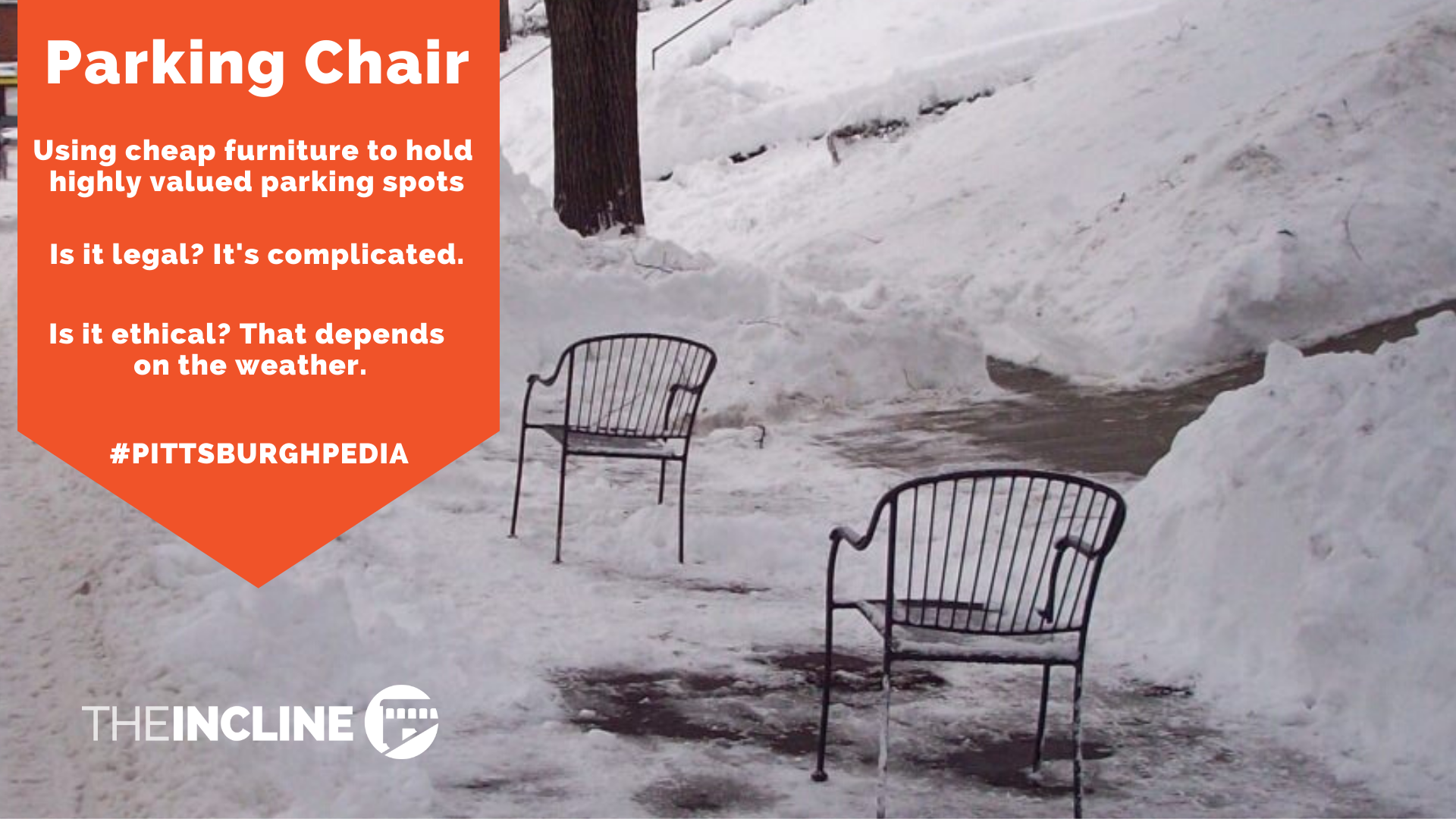
Know your weird and wonky Pittsburgh terms? This post is part of our Pittsburghpedia series, a handy glossary of words and phrases unique to our city that’ll help you #talklikeyoulivehere. Let’s fill you in. Today’s entry … The Parking Chair
WHAT IS IT? The practice of using cheap furniture, like folding chairs, to reserve highly valued (and public) parking spots, usually outside of someone’s home.
WHERE’D IT START? You could argue that the parking chair is the American notion of property rights run amok. You could point to the colonists or 17th century English philosopher John Locke as the originators of “dibs” as we know it.
But the roots of the parking chair are likely more simple and more modern.
The local tradition dates back to the mid-20th century, when a post-war boom in auto sales meant the number of cars began to outpace the number of available on-street parking spaces.
And it’s not just a Pittsburgh thing — parking chairs are used in older and denser American cities like Philadelphia, Boston, and Chicago, too.
HOW DOES THE PARKING CHAIR WORK? You leave a space and put a chair — or cones or an armoire or a restaurant tray stand — in the empty space to “reserve” it.
People typically do this with spots they’ve shoveled out after a snow to ensure their labor wasn’t in vain or, worse yet, for the benefit of strangers. (*see chair-ity.)
Then there’s this actual self-parking chair designed by Nissan. We have no idea how it works.
IS THE PARKING CHAIR LEGAL? As a police commander told the Post-Gazette, “Nobody owns a parking space. That’s a city street. You can’t put a chair out there to say, ‘This is my spot.’ Anybody is allowed to park there.”
Worst-case scenario, a parking chair user could be fined for littering, though this outcome is admittedly rare.
To recap: A parking chair affords you no legal claim to a spot and is not a legal placeholder. It’s also entirely legal for someone to remove your chair and take the spot.
Basically, if possession is nine-tenths of the law, it’s maybe five-tenths when it comes to this.
IS IT ETHICAL? Randy Cohen, who authored “The Ethicist” column for The New York Times Magazine from 1999 to 2011, said of winter dibs in an interview with Slate: “Shoveling out your car is simply the price you pay for storing your private property in our public space.” Cohen added that shoveling your sidewalk, for example, does not “transform it into your personal property. You can’t charge a toll to passers-by who want to walk on it. You can’t barricade it with hideous lawn furniture or suspiciously numerous beer coolers.”
John Locke, the English philosopher mentioned above, would likely have felt differently based on his belief that people own their labor and, with limits, the fruits of that labor as well. (This is a highly simplified take on John Locke. Find a less simplified take here.)
Boston Mayor Marty Walsh seems to agree, saying of winter dibs some 300 years after Locke’s death, “If you use manual labor to get your car out, I think for 48 hours, a couple days, you can have it.”
But Ray Jones, a business ethics professor at Pitt, said it’s also worth asking — h/t to Immanuel Kant — who stands to benefit, who has the greatest need, if residents of a street should have priority over outsiders when it comes to parking in a snowstorm, if the scarcity of parking options in a snowstorm changes the moral calculus, and whether the parking chair as a tool — or some version of it — is equally available to everyone in these same circumstances.
Of course, everything changes when we start talking about parking chair use outside of winter.
“(The ethical case for parking chairs) is less convincing or arguably does not hold up when talking about a person who puts a chair out constantly,” Jones told The Incline. “That is arguably closer to the other side and is taking away public resources.”
So, is the parking chair ethical? When snow and a shovel are involved, arguably, yes. Without the snow? Even the greatest thinkers would likely say you’re on your own.
YIELD TO THE CHAIR: Is the parking chair controversial? Sure. Is it a prelude to conflict? Potentially.
But it’s also a pop culture symbol, one found on alcohol, clothing, Pittsburgh’s latest tourism campaign, Christmas ornaments, and, somehow, on parking chairs themselves.
So, yes, while the parking chair is divisive and debated, it’s also a token of urban life — the good, the bad, and, when used outside of winter, the ugly.
And while Pittsburgh probably didn’t invent the parking chair, it may have perfected it. It certainly cornered the market.